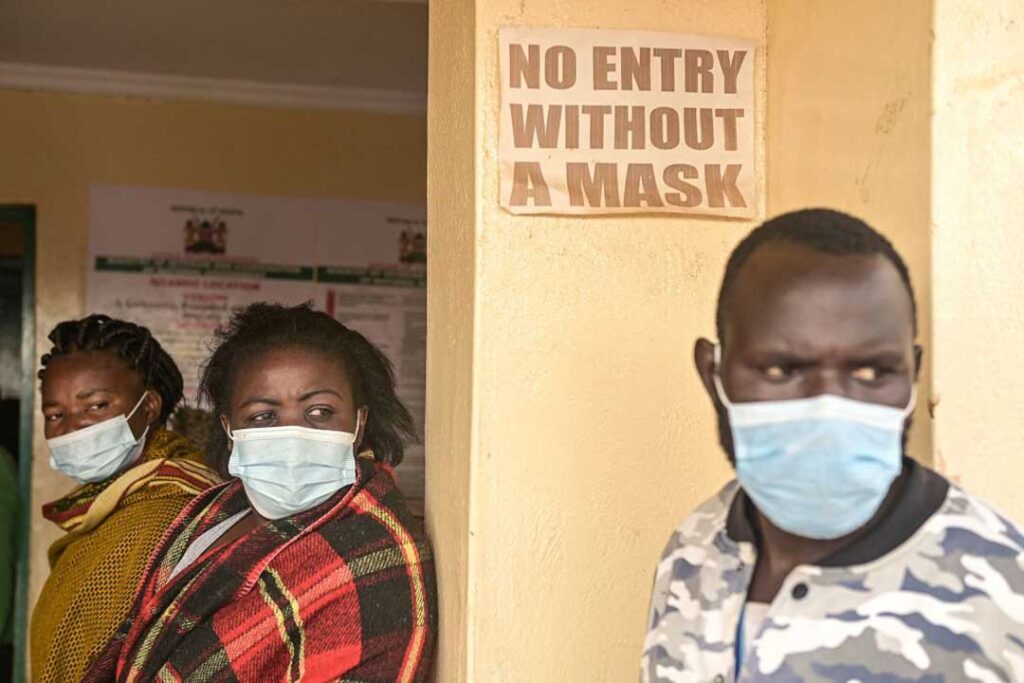ADF STAFF
The original COVID-19 strain took two days to two weeks to produce symptoms in infected people, but omicron moves much faster. It incubates in three to five days, according to World Health Organization (WHO) estimates.
That may explain why omicron is more contagious.
Although most omicron patients report less severe symptoms than previous strains produced, rising infection rates are filling hospitals and further taxing overworked health care workers. It also is producing newer symptoms, such as night sweats.
And it is still deadly.
“While omicron does appear to be less severe compared to delta … it does not mean it should be categorized as mild,” said Ethiopian public health expert Tedros Adhanom Ghebreyesus, director-general of the WHO. “Just like previous variants, omicron is hospitalizing people and it is killing people.”
Early studies showed there was a reduced risk of hospitalization from omicron, and there appears to be a reduced risk of severe illness in most people, Janet Diaz, WHO team lead on clinical management, said. But she added that most cases studied have been in younger people, making omicron’s effects on the elderly largely unknown.
The shorter incubation period also makes it more difficult for medical workers to reliably and quickly test for it.
In South Africa, omicron accounted for more than 90% of new infections in mid-December, according to Dr. Ryan Noach, chief executive officer of Discovery Health, South Africa’s largest private health insurer.
“The omicron-driven fourth wave has a significantly steeper trajectory of new infections relative to prior waves,” Noach said in a report on Discovery Health’s website. “National data show an exponential increase in both new infections and test positivity rates during the first three weeks of this wave, indicating a highly transmissible variant with rapid community spread of infection.”
Studies have shown that omicron is less likely to invade a person’s lungs than previous strains.
In South Africa’s Western Cape province, public hospitals reported fewer coronavirus-related admissions and fewer pneumonia-related deaths during the fourth wave driven by omicron compared to the third wave fueled by the delta strain, according to a report by South African online news publication News 24. The Western Cape Health Department also reported a decreased use of medical oxygen when treating omicron patients.
However, the risk of reinfection from the omicron strain is greater than previous variants, Shirley Collie, chief health analytics actuary at Discovery Health, said.
“With each successive wave of COVID-19 infection in South Africa, we have investigated the durability of immunity following previous infection with COVID-19 – in other words, the risk of reinfection,” Collie said. “Overall, the risk of re-infection (following prior infection) has increased over time, with omicron resulting in significantly higher rates of reinfection compared to prior variants.”
Immunity from prior infections may explain why omicron produces milder symptoms — such as a scratchy throat, fatigue and night sweats — than previous strains, South Africa’s Health Minister Joe Phaahla said in a report by Vox.com.
Due to South Africa’s relatively young population, John Nkengasong, director of the Africa Centers for Disease Control and Prevention, warned other countries that they might have different experiences with omicron.
“Let’s be careful not to extrapolate what we are seeing in South Africa across the continent or across the world,” Nkengasong said in a media briefing. “We still have to gather more data from countries that are seeing more of the omicron variant before we can come out with a definitive position.”
Recommended isolation times for omicron patients vary from country to country, but health experts around the globe say people should continue observing COVID-19 prevention measures, such as wearing masks in public, practicing social distancing and washing hands frequently.
Although many omicron patients do not experience severe symptoms, they still could infect people at risk for critical illness, Akiko Iwasaki, a researcher who studies viral immunology at Yale University, told Reuters.
“We have no data yet on what proportion of infections with omicron … end up with long COVID,” Iwasaki said. “People who underestimate omicron as ‘mild’ are putting themselves at risk of debilitating disease that can linger for months or years.”

